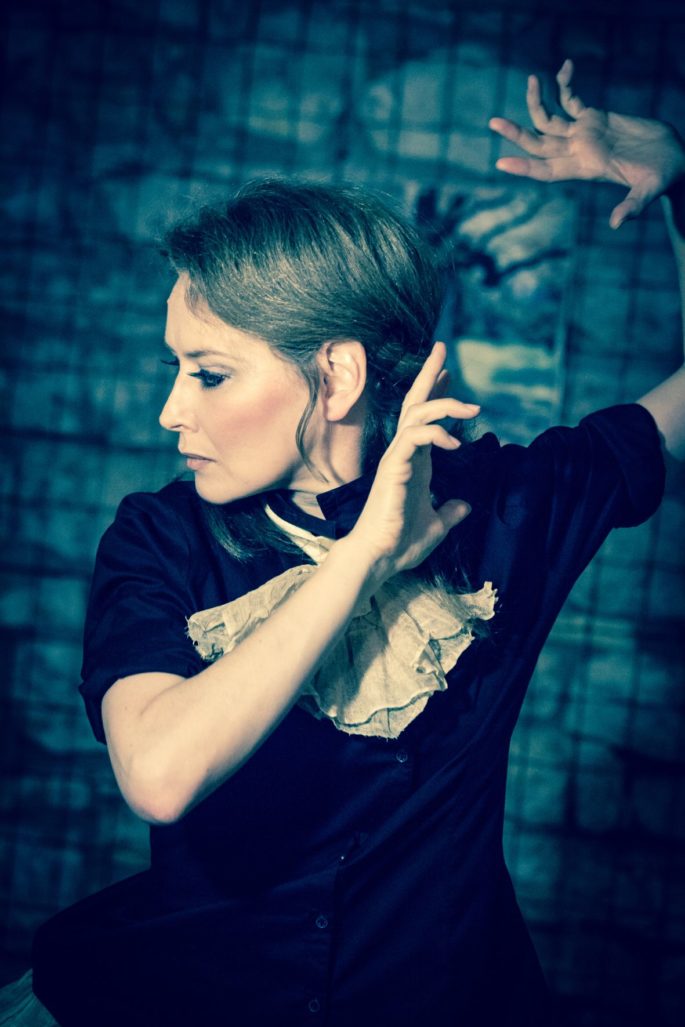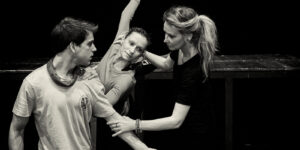Did you think for a long time before you accepted the position of the head of the Liberec Ballet a year ago? What did you consider?
Not really. I act very intuitively. Although... I never seriously considered anything like this, but this offer from Martin Otava - the director of the theatre - came just at the moment when I had a great season behind me, filled mainly with three full-length ballets for three different companies. It was a great collaboration with all of them, but I was beginning to realize what a privilege it is to have a company that feels your style. I mean in the longer term, not just on opening night.
Being a "freelancer" is a wonderful freedom, but you always start from the beginning. You put in a few practices, and no sooner do the dancers know what you're up to, there's opening night, regular repertoire, quick rehearsals, and it's all gone.
And yet style is what contemporary ballet is all about. Technique should be a given, but style is the superstructure. You know a dancer who dances for Duato, Ek, Naharin, McGregor. They feel them, they feel at home in their choreographies, you can see it in their expression, freedom of movement, even in difficult figures... How different it looks when another company takes over their repertoire ! - And that's what the big orchestras lack nowadays, for example. You used to be able to recognize the sound of the Czech Philharmonic, the London Philharmonic... Today, thanks to globalization, the turnover of musicians, but also thanks to the fact that one personality does not stay in their leadership for a long time, you can hardly do it. They all "fiddle" equally well or equally badly.
In the Liberec ballet company there are also dancers with very different techniques - "Russian - classical", "Czech - all-round" ... and we also have elévas. My wish is immodest: to unify technique, style. And to let the Liberec ballet "sound" with its original and unmistakable "sound". The partial loss of freedom, the quality of the company, and the writing of the fermans!!!
What surprised you the most in your first year in Liberec - both in the good and the bad?
In a good way, it's primarily a set. When I saw them for the first time at practice, I thought, "Well, either they go, at least most of them, or I go. I thought some of the technical issues and stereotypes were irreparable. All the ladies fundamentally wrong body positions - sunken groins, over-turned feet, the gentlemen - loose backs, no head work, dancers from former Soviet republics pretending that this is the way to do it, otherwise they won't do it, and yet they just do all the nasty clichés. Ironically, it was one elite dancer I liked the most. I am very happy to see them today. They just weren't told what they wanted. During that year, they have had many teachers - Václav Janeček, Kateřina Benešová, Igor Žukov, Adéla Pollertová, myself, and nowadays mainly Hana Turečková, who works with them as a rehearser. They are open to everything that is new for them. And when I saw them at the last premiere of Ballet(ob)session, where they also appeared as choreographers, I was almost moved. Of course, not everything is ideal yet.The worst part is the attendance at dance performances. Everyone tells me it's getting better now. But I dare to be immodest again: I will be satisfied when the audience is fighting for tickets in front of the theatre.
In what ways did you have to compromise from your original ideas?
I have to discount all the time somehow. For example, because of finances. We take scenes and costumes from the fundus and there are many other things: the capacity of the ensemble, still its technical and expressive equipment. On the other hand, a certain constraint is always a challenge for artists. I recently read interviews with Stravinsky. While he was in Russia, he didn't have much freedom to create, he didn't have finances or good performers. In Paris, he suddenly had everything. He quickly realized the danger of this freedom, and so he limited himself very consciously. He told himself, for example, that in a piece on such and such a theme he would use only these notes. It's as if the painter had said to himself that "Dawn" would only depict green and black. So maybe I wouldn't call it discounting. I can't discount what I want to achieve. I would call it the necessity to play only with the cards I have in my hand, looking for other, perhaps better solutions, making the best of the shortcomings... But: of course I don't want to do it like this forever and I look forward to the "Stravinsky situation" -:).
In your opinion, what are the advantages and disadvantages of the Liberec ensemble, especially in comparison with other regional ensembles in the Czech Republic?
It's a really small file. I mean, the smallest in the country, so any comparisons fall short. Fourteen dancers in all. We don't get a chance to play some chorus and solos. You'd be hard-pressed to find two dancers of the same build. So there are "only" all the virtues of a chamber ensemble. It gives me a chance to make everyone a personality, but - as I've already hinted - within one style.
What is the audience in Liberec that comes to see you?
Mostly conservative and older, but young people have started coming to Periphery and saying it's a "great musical".I laugh at that, but I'm glad they're there and I want more of them. The older and conservative ones come to the debates after the opening night. We had a nice fight last time, over the original music for The Never Ending Story. They said, "What's that clacking from Miss Composer - all denervating intervals and grunts... Where's Master Smetana?" So I reminded them of how their old master had not accepted them at all, calling him a Wagnerian, and calling for his bel canto .In the end we all laughed, and they promised to come again with a more open mind.
You are also well known from your work - both as a dancer and choreographer - in the Pilsen theatre; many dancers still remember your choreography of Marysha. How do you remember your engagement in Pilsen? And what do you remember most often?
I have very fond memories and only good ones. Pilsen Ballet had and has a good background. I had my fans there, I got beautiful roles there, I did my first "full-length" ballet there - Marysha, and that was like my first love. I didn't know what to expect from myself. - And even before that: we were much younger, I could stand dancing all night in a bar, then go straight - and with gusto! - I would have died today -:).
And which of your dance roles do you remember most? I remember from somewhere that you had some kind of accident a few years ago - how does it look with your further dancing?
It's hard to make any preferences. I enjoyed the tender and romantic Lady with Camellias on stage, as well as the brutal embodiment of evil Lady Macbeth. I also liked the comic Pamina. And now I'm enjoying the brooding Morgiana. I've had an accident and I don't think I'd be 100% technically usable for other choreographers anymore. But I'm not getting off the stage yet. I'm doing what I can, and I'm also building my choreography "to suit". I founded UMB (Ultra-minimal-ballet), which is an independent association of professional dancers based on the idea of maximally impressing the audience with minimal means - minimal space, minimal number of dancers, minimal music, minimalist movements... Apart from festivals, openings and other events where we perform shorter pieces, we also have a full-length dance horror Jessie and Morgiana with original music by Gabriela Vermelho, who also performs with us. I really enjoy "climbing" into spaces where no one expects ballet. Right now I'm toying with the idea of starting a UMB5 for "over-aged" dancers - a bit of a recession, of course...We know what NDT3 is... (
editor's note: the now defunct Nederlands Dans Theater III was formerly Kylian's company for early-born dancers
) But no, no, it will be very serious...A dancer who has that "background" behind them, who has mastered or is mastering the most difficult technical stuff, can afford to just walk across the stage and - "there you go". It's just that the "background" has to be there, of course, but many "performers" get it wrong! Kandinsky could afford to make two lines on the canvas because he mastered the figure, the landscape, the Art Nouveau ornament and the chiaroscuro... Please tell today's "conceptual artists" to cut out the figure for you? They'll pretend to despise it, but they just can't do it... And in the dance world it's the same... Yuck!
You have also choreographed some of your works for opera. Which of them do you appreciate the most?
I guess it would be Foxy the Cunning Little Vixen, then the rock opera Juno and Avos - I like that music very much - and then maybe the last one I did with the Liberec Opera and Ballet - Rubinstein's Demon.
Do you choreograph lightly? How long does the theme and its overall composition mature in your head?
I have three phases. Both in the development of the theme and in the actual choreography. In the first phase I just let it all work on me and I want to remember all the feelings. In phase number two, I have to work out all the technical difficulties. And in the third phase I have to connect both, then forget and just experience with the dancer's body and the spectator's eyes... In choreography it looks like I'm thinking about what I want to say. I put on the music, stand in front of the mirror and start moving as I feel natural - which is usually the height of unnaturalness for dancers. Then my combinations have to get really "worked up" until it becomes natural for the dancers and they only think about what they are "saying". Such movement is then conscious on a technical and content level and it can be felt. For me, the music is also very important. The dancer has to work with it according to the choreographer's instructions. Today everything is possible. Of course I can only use it as a background - then the dancer must have his own, clear heavy periods , impulses, acceleration... I can copy the music - how simple and effective! Civilian movements as if by chance for the first time, to go to the music in counterpoint, to create a second rhythm - then the composers consider me a complete dilettante and say: "Please, why do you count to two when it's on three ?!" And I say, "I'm not here to copy you, what a wonderful tension there is between the rhythms, just like the classic bolero step." So a choreographer or a dancer who doesn't work with music is dead to me. But sometimes it's hard to know whose fault it is.
To add to what we have already talked about: isn't it an advantage for a choreographer to work as a so-called "freelancer", as you tried before coming to Liberec? I mean a more varied life, meeting new people, more impulses for yourself from the outside?
I came into this position with the understanding that I would limit my other activities only partially. I don't think I am cheating Liberec in anything, I have reliable repeaters so far. Working with only one ensemble would be artistic stagnation and they would get "fed up" with me after a while. I am currently transferring Jessie and Morgiana to Ústí nad Labem, working on the aforementioned UMB and preparing the concept of Troubadour for the open air in Malta. Of course - I still have to leave room for self-education and "hunting" for some inspiration. I would hate to find myself at the stage where I confuse artistic handwriting with robbing myself. There are so many sources of inspiration that I have only sniffed. Whether in movement itself - yoga, martial arts, folk, ballroom, other choreographers' dance techniques, or in areas outside the field - which is more fundamental for me: literature, visual arts...
Probably a very difficult question, but please try: how do you think the Czech ballet is at the moment?
Contemporary Czech ballet is doing exactly as it deserves. Now I'm going to repeat myself and I'm not hiding the fact that I'm going to exaggerate a bit. There are three Swan Lakes currently running in Prague, on three different stages, in three different productions, and they all make a living. I won't mention their quality. Swan Lake is simply the biggest "commercial" in ballet. You put on Swan Lake and you can't lose. Every snob wants to see it and then applauds and applauds... - without evaluating, without comparing... without having a "clue". Then there's the other extreme - the so-called. the "independents" who are very dependent on smaller or larger grants. In Prague, I'd estimate the number at two hundred. They attend each other's performances. And if you add friends and parents... Hulahop! You have a full auditorium - and success! Of course, you rarely come across a "civilian" there, which is often a pity, because there are some quality performances. But more often - as I like to say - people throw themselves on the floor for three hours and pretend some abstract emotion. They deal with feminism, pessimism, Marxism, Leninism... You can just put it on anything. I don't understand it myself. In my own body, I recognize it like this: I go to Japan every year with a concert program. I walk on stage with a brilliant crown on my head, satin toes, and suddenly three thousand Japanese people are applauding me. Without doing anything! At that moment, I'm thinking, "Oh, my God! A month later, I'm about to perform Jessie and Morgiana at the Malostranska Bolshoi, and I pray that at least a few "street" spectators will come. What does it all mean? That only snobs go to the ballet or a closed cult society around dance? For God's sake no - there are exceptions: many companies have their fans and critics, audiences who have insight. But why are they exceptions, and why are they so few compared to other disciplines? Whose fault is that? - Well, first of all, it's the fault of us "ballet" people. It's our fault for making ballet either a museum or a "terribly intellectual and philosophical" affair. Secondly, it's the viewer's fault for not choosing, not looking, not comparing, not shouting "bravo". He swallows it and doesn't come next time. I think the solution is in the "narrative". An intelligible narrative, but not in a banal, trivial and semi-popular form. Maybe even in the abstract, it doesn't have to be stories. It can be narrated thoughts, emotions... But you have to give the viewer the feeling that he understands it, and you have to leave room for his questions, his imagination... And that's what works so well without words. And sometimes it's a great strength - the combination of music, gesture... There are such performances. You have to find them. Ballet is not dead. With movement, you can say almost anything. It's just harder to lie without words.
In conclusion, I'll be very frank: I have a bit of a workaholic feeling about you. Besides the theatrical one, do you also live a "normal" life at least sometimes?
Also, I'll be honest: You're probably right, but that will probably change now. I'm eight months pregnant right now and I don't know what it's going to do to me. Maybe I'll want to be a housewife for ten years...::) Anyway, I don't see it that way yet. I don't want to leave the train running in Liberec, in the spring there should be Troubadour and with director Martin Otava Jenůfa for the Slovak National Theatre.So it looks more like - if we are all healthy - that it will be a theatre boy - a traveller. But this year I didn't take any scripts or literature on holiday. Only the Old Greek Fables and Legends to whisper in my belly... Well, after reading Psyche and Eros - I see it as a bizarre pseudo-Baroque dance theatre!)
Thank you for the interview and I wish you all the best not only in your dancing but also in your private life!




Comments are closed.